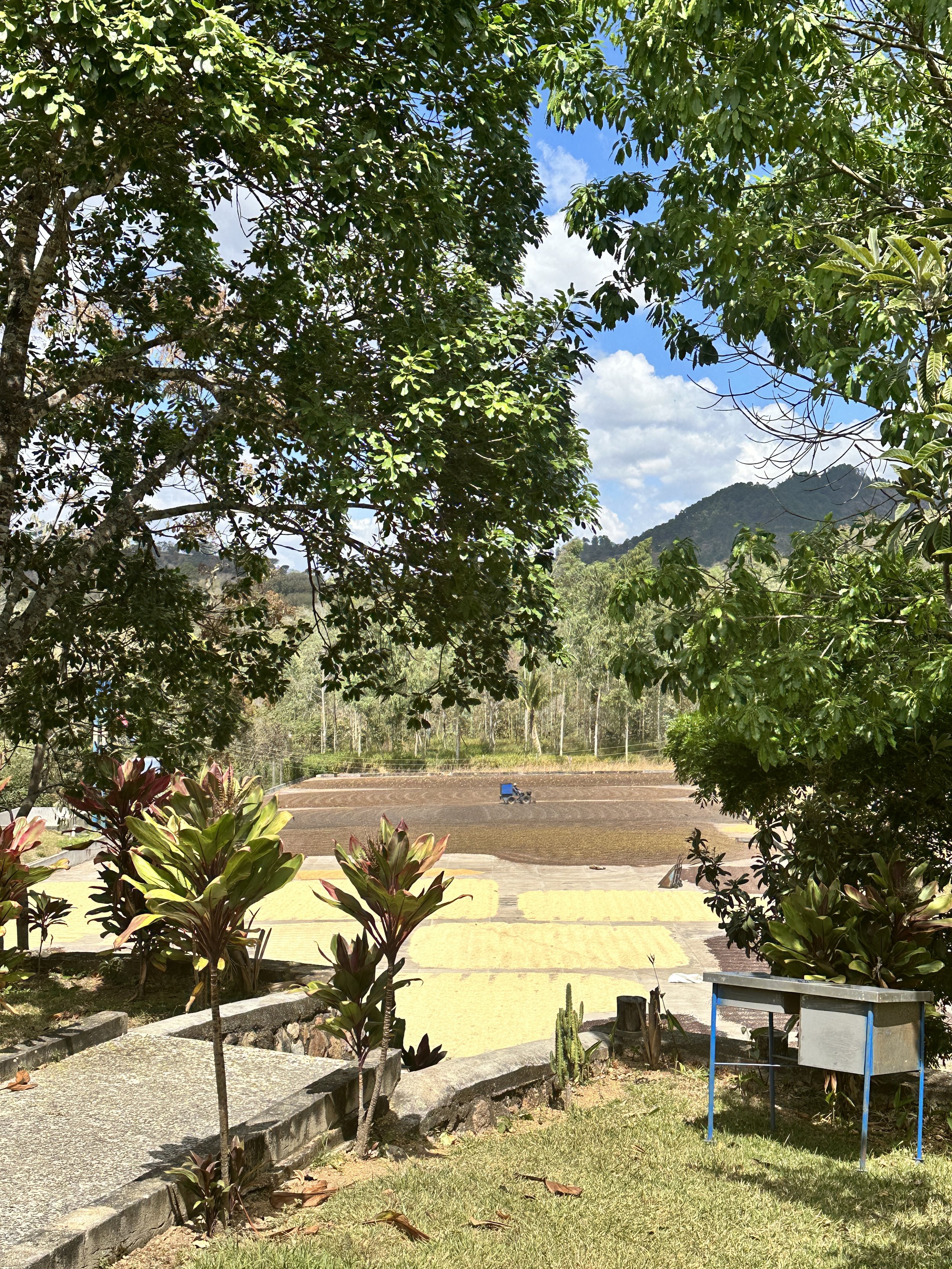Guatemala Natural Coffee and Updates from Finca Las Marias
Earlier this year, Michael and I had a chance to return to Esquipulas, Guatemala to visit our coffee partner, Erick Toledo, and his brother-in-laws Raul and Rolando, who are also coffee farmers. Our first visit was in early 2020–a month before the global shutdown–and we were very curious to see what’s changed since our first visit.
Before Erick was responsible for Finca Las Marias, the farm was crowded with coffee trees. While it might seem like more trees mean more coffee cherries; having a crowded farm has its challenges: it’s harder to prune the trees, harder to pick cherries, and the trees also have to compete with one another for resources. All of these factors combined can make it more difficult for trees to grow coffee cherries efficiently. Erick decided to remove older trees and created neat rows that are spaced two meters apart from one another. There are now 8000 organized trees on the farm, and Erick intends to plant another 4000.
Banana trees towering over neat rows of coffee trees
There are banana trees all over Finca Las Marias, which serve as shade and provide water and extra nutrients to the coffee trees. Banana trees grow quickly; they can reach their full height (20-40 feet) in as little as six months. So what happens to all the bananas? Erick gives them to all the farm workers, who are welcome to either consume the bananas, or sell them at the market themselves and make extra income.
Once a month, Erick also applies biofertilizer to the coffee trees. The fertilizer, which Erick makes in his hometown of Santa Lucia (and where he spends his time in the off season), is full of microorganisms that help trees to better absorb nutrients.
Two 1200L containers of biofertilizer that Erick uses on the trees. Every month, fertilizer is decanted and applied to the trees.
During our visit in 2020, Erick took us to the large central wet mill for the farm, where pickers would load the cherries onto a truck that would then transfer the cherries to the wet mill. This transit takes up both time and resources. Unpulped cherries take up more space and carry extra weight, so more trucks and gas need to be used for transit. For better efficiency, Erick had a mobile wet mill built: one that’s small enough to pack up, load onto a truck, and bring it to another location. This is the first time Michel and I have ever seen something like this, and is the coolest innovation we’ve seen at the farm!
Erick explains that unripe cherries have harder skin and are difficult to pulp, so they’re easy to sort out from the machine. Harvest season had wrapped up, so unfortunately we couldn’t see the mobile mill at work!
The mobile wet mill has a machine that removes most of the cherry mucilage. To finish cleaning the coffee, a mobile washer uses 250ml of water per kilogram of depulped coffee to finish the cleaning of the wet parchment. The wet parchment is then immediately transferred to Rolando’s dry mill, where they are placed on a drying patio. In the next phase of making improvements, Erick will build more platforms around Finca Las Marias so that the mobile wet mill can be easily set up. He will also build solar dryers near the platforms so that coffees can dry immediately after washing.
Cupping one of many sets at Rolando’s lab!
On this trip, we also spent a bit of time at Rolando’s lab that is located at the dry mill. I roasted almost two dozen samples, and we spent a long afternoon cupping all of them. Some of the samples were coffees that we were going to blend and use for our Short Strand blend, while other samples were simply coffees for us to taste and share our feedback. One of the most memorable cups I tasted that day was a geisha from Raul’s farm, which reminded me of yellow peaches and fresh coriander!
View of the drying patio once you step out of the lab and office at Rolando’s dry mill. Down below, there is a large warehouse where coffees are sorted and prepared for export. Rolando’s mill processes coffee for his family and also other farmers in the area.
We’re happy to continue working with Erick and love seeing all the improvements he’s made over the past years. We can’t wait to see how the coffees will change over the next several years as the farm continues to grow. While we wait for the new harvest that’s meant for Short Strand and another exciting project we have up our sleeves, we’re featuring the latest harvest of the natural coffee from Finca Las Marias. It’s our second year featuring this coffee, and it’s as sweet and juicy as it was before. We taste green apple, melon, and milk chocolate–an easy choice for those who enjoy light fruity notes in their cup!







